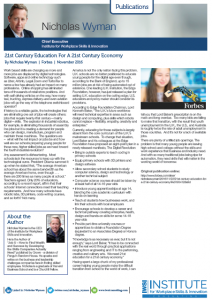By Nicholas Wyman, Forbes, November 2016
Work based skills are changing as more and more jobs are displaced by digital technologies. Software, apps and online technology such as Uber, Airbnb, Legal Zoom and TurboTax to name a few has already had an impact on many professions. Online shopping has eliminated tens of thousands of retail store positions. And with self-driving vehicles on the way, how many taxi, trucking, express delivery–and even aviation jobs–will go the way of the telephone switchboard operator?
If history is a reliable guide, the technologies that are eliminating one set of jobs will create others: jobs that require twenty-first century—mainly digital—skills. The explosion in industrial robotics, for example, is eliminating thousands of assembly line jobs but it is creating a demand for people who can design, manufacture, program and maintain those machines. The questions are – what will the net impact on jobs be and how well are our schools preparing young people for those new, higher skilled jobs as we head toward the fourth industrial revolution?
 Any assessment is disheartening. Most schools lack the resources to keep up with the technological curve. President Obama summed it up when he stated that, “The average American school has about the same bandwidth as the average American home, even though . . . there are 200 times as many people at school.” Teachers agreed. Only 20% of educators, according to a recent report, affirm that their schools’ Internet connections meet their teaching requirements. And how many schools have robotic labs, 3D printers, code writing courses, and so forth? Not many.
Any assessment is disheartening. Most schools lack the resources to keep up with the technological curve. President Obama summed it up when he stated that, “The average American school has about the same bandwidth as the average American home, even though . . . there are 200 times as many people at school.” Teachers agreed. Only 20% of educators, according to a recent report, affirm that their schools’ Internet connections meet their teaching requirements. And how many schools have robotic labs, 3D printers, code writing courses, and so forth? Not many.
America is not the only nation facing this problem. U.K. schools are no better positioned to educate young people for the digital age even though, according to the Bank of England, up to 15 million jobs are at risk of being automated out of existence. One leading U.K. institution, the Edge Foundation, however, has just released a plan for setting U.K. education on the cutting edge; U.S. educators and policy maker should consider its provisions.
According to Edge Foundation Chairman, Lord Kenneth Baker, “The U.K.’s future workforce will need technical expertise in areas such as design and computing, plus skills which robots cannot replace – flexibility, empathy, creativity and enterprise.”

Currently, educating for those subjects is largely absent from the core curriculum of the U.K.’s mainstream schools. To change that situation, Lord Baker and his colleagues at the Edge Foundation have proposed an eight-point plan in a newly released manifesto,
The Digital Revolution:
• Bring in outside experts to teach coding in primary schools
• Equip primary schools with 3D printers and design software
• Allow secondary school students to study computer science, design and technology or another technical subject
• Computer science courses should be taken by at least half of all 14-16 year olds
• Introduce young apprenticeships at age 14, blending the core academic curriculum with hands-on learning
• Teach all students how businesses work, and link their schools with local employers
• Encourage schools to develop a career and technical pathway covering enterprise, health, design and hands-on skills for some 14-18 year-olds
• Provide part-time university courses or apprentices to obtain a Foundation Degree (equivalent to an Associates Degree) or Honors degree.
“Knowledge is as necessary as ever, but it is not enough,” says Lord Baker, “It has to be connected with the real world through practical applications ranging from engineering and IT to the performing, creative and culinary arts. We need 21st education for a 21st century economy.”
Having spent a large chunk of my professional career helping young people make the difficult transition from school to the world of work, I can tell you that Lord Baker’s prescription is on the mark and long overdue. Too many kids are failing to make that transition, with the result that youth unemployment in the U.K., the U.S., and Australia is roughly twice the rate of adult unemployment in those countries. And it’s not for a lack of available jobs.
There are plenty of unfilled job openings. The problem is that many young people are leaving high school–and college–without the skills and work experience that business and industry need. And with so many traditional jobs being ripe for automation, they need skills that will matter in the working world of tomorrow.
